UConn Study Questions Marketing, Ingredients in Food Advertised to Young Children
/It would be disingenuous to describe the results as surprising, but a new study has found that marketing for baby and toddler food and drinks often contradicts the advice of health professionals.
According to the study by the Rudd Center for Food Policy and Obesity at the University of Connecticut, companies tend to use marketing messages that may lead parents to believe that these commercial products are healthier alternatives to breastmilk or homemade food.
The new Baby Food FACTS report found that companies spent $77 million in 2015 to advertise infant formula, baby food, and toddler food and beverages to parents, primarily through TV, magazines, and the internet. By comparison, companies spent $98 million to advertise fruits and vegetables in 2015 – products intended for the entire U.S. population.
“Our analysis shows that marketing for baby and toddler food, infant formula, and toddler milk and nutritional supplements often contradicts expert guidance and in some cases encourages parents to feed their young children products that may not promote healthy eating habits,” said Jennifer Harris, UConn Rudd Center Director of Marketing Initiatives and the report's lead author.
The report analyzed companies spending $100,000 or more in total advertising in 2015 and documented changes in advertising over the past five years. Eight brands from three companies (Nestle, Abbott and Mead Nohnson) were responsible for 99 percent of advertising spending. Four additional baby and toddler food brands spent $100,000 or more in advertising in magazines and online, including Plum Organics (Campbell Soup Company), Beech-Nut (Hero A.G.), and Happy Baby and Happy Tot (Nurture Inc.).
Among the findings:
- Infant formula brands had the most internet advertising and were most active in social media and on mom blogs.
- Nearly 60 percent of advertising dollars promoted products that are not recommended for young children, including sugar-sweetened toddler drinks and nutritionally poor snack food.
- Beech-Nut and Gerber marketed their baby food products in a way that supported most expert recommendations on best practices for feeding infants.
- Toddler milk products including Enfagrow, Gerber Good Start Grow, Nido 1+, Similac Go & Grow, and Happy Tot Grow & Shine, contained added sweeteners, including sugar, glucose syrup solids, honey, and corn syrup solids.
- Pediasure Grow & Gain, a nutritional supplement aimed at toddlers, had 240 calories per serving and as much sugar as an 8-ounce sports drink.
- In contrast to nutritious baby and toddler fruit, vegetable, and meal products, just four of 80 baby and toddler snack foods, such as cookies, cereal bars, puffs, and fruit snacks, were nutritious choices for young children.
- Fifty percent of baby and 83 percent of toddler snacks contained added sugars.
 The findings included in this report “provide policymakers, health professionals, public health advocates, industry representatives, and parents an opportunity to address misinformation conveyed through marketing of baby and toddler food and drinks.”
The findings included in this report “provide policymakers, health professionals, public health advocates, industry representatives, and parents an opportunity to address misinformation conveyed through marketing of baby and toddler food and drinks.”
The study also found that traditional advertising spending (primarily on TV and magazines) by infant formula brands declined substantially—from more than $30 million in 2011 to less than $10 million in 2015.
Among the recommendations, the Rudd Center researchers indicated that toddlers’ diets should help them develop gross and fine motor skills and learn to enjoy the taste, flavors, and textures of real fruits and vegetables. By age two, toddlers should be eating the same food as the rest of the family. For all children, they stated, a healthy diet should include a variety of fruits and vegetables every day, and limited consumption of saturated fat and sodium. Children under two should not consume any food with added sugars.
The report called on the U.S. Food and Drug Administration to issue final guidance on claims on infant formula packaging, including claims that compare infant formula to breastmilk, and also regulate claims on toddler milk packaging. The Federal Trade Commission should similarly regulate claims made in advertising, the report advised. The food industry was also urged to expand the Children’s Food and Beverage Advertising Initiative (CFBAI) self-regulatory program for improving food advertising to children to incorporate marketing of baby and toddler food and drinks.
The study was funded by a grant from the Robert Wood Johnson Foundation and presented Nov. 1 at the American Public Health Association’s 2016 Annual Meeting and Expo in Denver. The Rudd Center for Food Policy & Obesity at the University of Connecticut is a multi-disciplinary research center dedicated to promoting solutions to childhood obesity, poor diet, and weight bias through research and policy. For more information, visit www.UConnRuddCenter.org.



 About two-thirds of Hispanic workers are U.S. citizens – Puerto Ricans (98.7 percent) and Spaniards (90.9 percent) are the groups most likely to be citizens;
About two-thirds of Hispanic workers are U.S. citizens – Puerto Ricans (98.7 percent) and Spaniards (90.9 percent) are the groups most likely to be citizens;

 Reading: children who had no regular early care and education arrangements the year before kindergarten and those whose primary arrangements were home-based relative care or non-relative care tended to score lower than children who were primarily in center-based care or who spent the same amount of time in multiple care arrangements.
Reading: children who had no regular early care and education arrangements the year before kindergarten and those whose primary arrangements were home-based relative care or non-relative care tended to score lower than children who were primarily in center-based care or who spent the same amount of time in multiple care arrangements.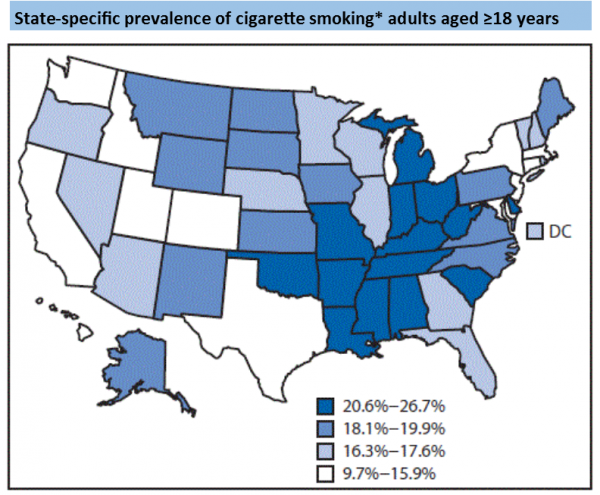
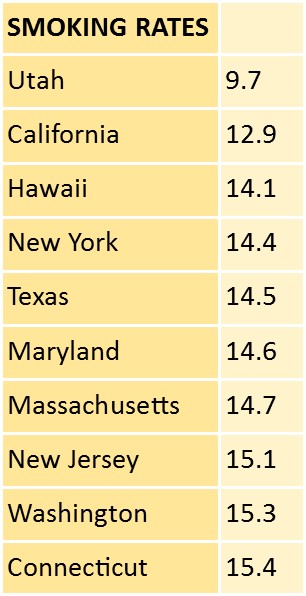 Prevalence of any cigarette and/or smokeless tobacco use ranged from 11.3% (Utah) to 32.2% (West Virginia). Connecticut was 15.3 percent.
Prevalence of any cigarette and/or smokeless tobacco use ranged from 11.3% (Utah) to 32.2% (West Virginia). Connecticut was 15.3 percent.

 According to the most recent data, adult obesity rates now exceed 35 percent in four states, 30 percent in 25 states and are above 20 percent in all states. Louisiana has the highest adult obesity rate at 36.2 percent and Colorado has the lowest at 20.2 percent.
According to the most recent data, adult obesity rates now exceed 35 percent in four states, 30 percent in 25 states and are above 20 percent in all states. Louisiana has the highest adult obesity rate at 36.2 percent and Colorado has the lowest at 20.2 percent.
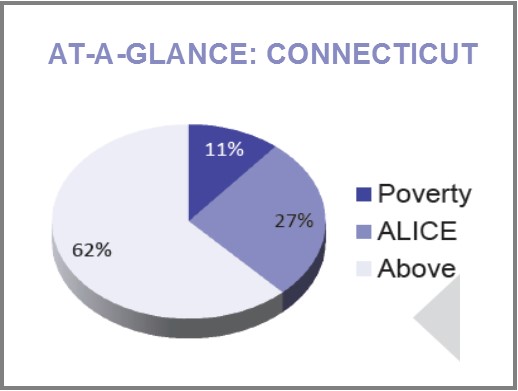



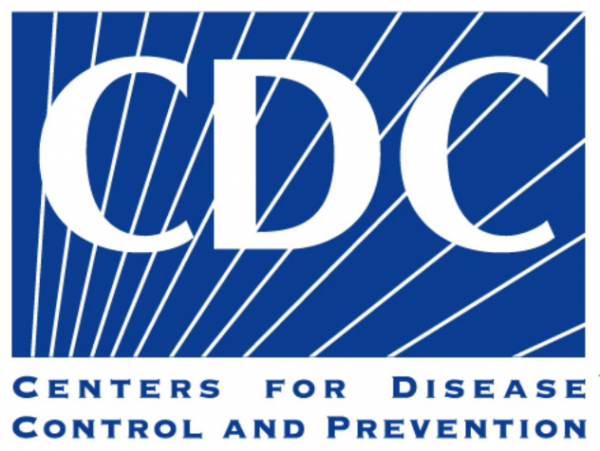 eaths due to diabetes, and 48th in deaths caused by stroke. The state ranked 15th, however, in deaths caused by septicemia and 35th in accidental deaths.
eaths due to diabetes, and 48th in deaths caused by stroke. The state ranked 15th, however, in deaths caused by septicemia and 35th in accidental deaths.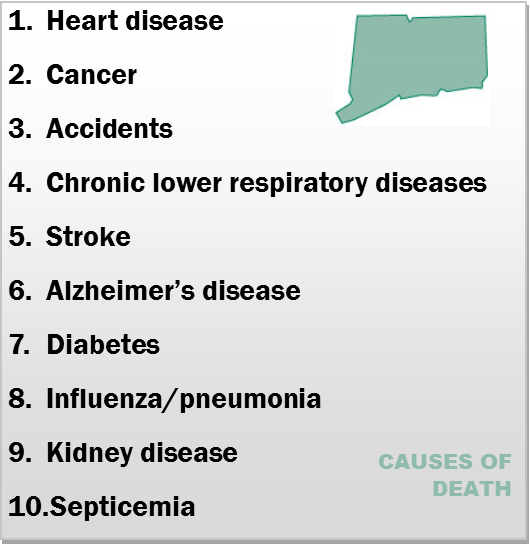
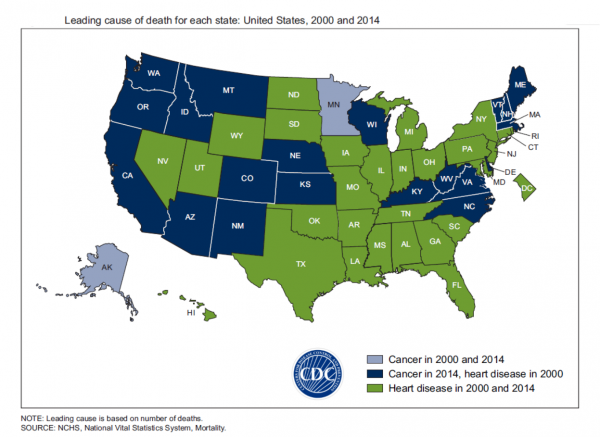

 At #296 is Glastonbury-based Fiondella Milone & LaSaracina. FML was founded in 2002 “for the purpose of providing professional auditing, tax and business consulting services to a wide range of clients and industries throughout the Northeast,” the company’s website indicates. After working together at Ernst & Young, the firm’s founding partners, Jeff Fiondella, Frank Milone and Lisa LaSaracina launched FML.
At #296 is Glastonbury-based Fiondella Milone & LaSaracina. FML was founded in 2002 “for the purpose of providing professional auditing, tax and business consulting services to a wide range of clients and industries throughout the Northeast,” the company’s website indicates. After working together at Ernst & Young, the firm’s founding partners, Jeff Fiondella, Frank Milone and Lisa LaSaracina launched FML. counting newsletter and the award-winning National Benchmarking Report.
counting newsletter and the award-winning National Benchmarking Report. In addition to the expert panel on opioid abuse, there will be more than 30 presenters on public health topics, a presentation on the history of CPHA and public health in the
In addition to the expert panel on opioid abuse, there will be more than 30 presenters on public health topics, a presentation on the history of CPHA and public health in the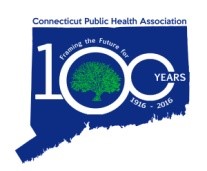 state, and a look forward to the future and innovations on the horizon in health research, policy, and community programs.
state, and a look forward to the future and innovations on the horizon in health research, policy, and community programs.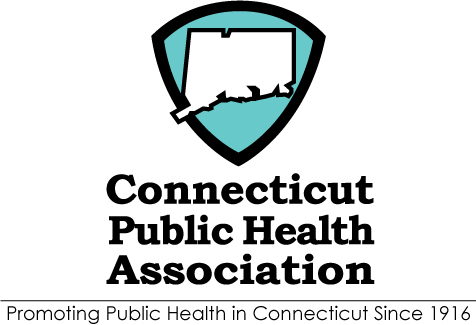 She seeks to broaden the national health debate to include not only universal access to high quality health care but also attention to the social determinants of health (including poverty) and the social determinants of equity (including racism). As a methodologist, she has developed new ways for comparing full distributions of data (rather than means or proportions) in order to investigate population-level risk factors and propose population-level interventions.
She seeks to broaden the national health debate to include not only universal access to high quality health care but also attention to the social determinants of health (including poverty) and the social determinants of equity (including racism). As a methodologist, she has developed new ways for comparing full distributions of data (rather than means or proportions) in order to investigate population-level risk factors and propose population-level interventions.
 e: Financing Women’s Growth-Oriented Firms (published by Stanford University Press), which points to “three essential factors that women entrepreneurs need to thrive: knowledge, networks, and investors. In tandem, these three ingredients connect and empower emerging entrepreneurs with those who have succeeded in growing their firms while also realizing the financial and economic returns that come with doing so.”
e: Financing Women’s Growth-Oriented Firms (published by Stanford University Press), which points to “three essential factors that women entrepreneurs need to thrive: knowledge, networks, and investors. In tandem, these three ingredients connect and empower emerging entrepreneurs with those who have succeeded in growing their firms while also realizing the financial and economic returns that come with doing so.”


























